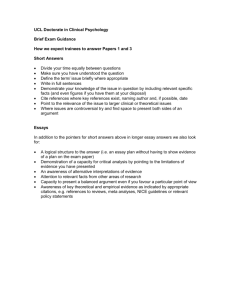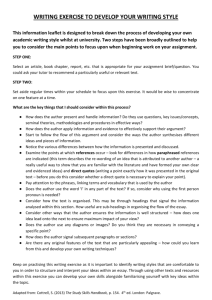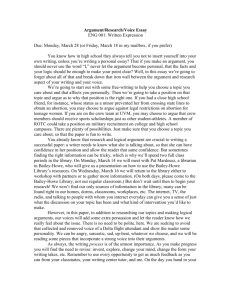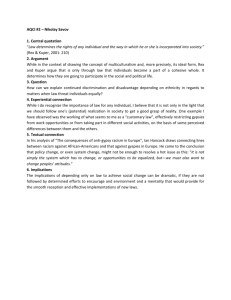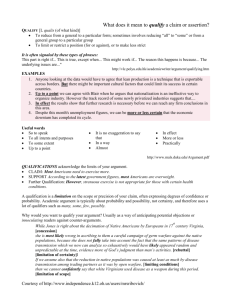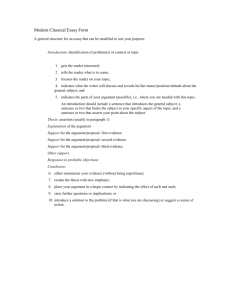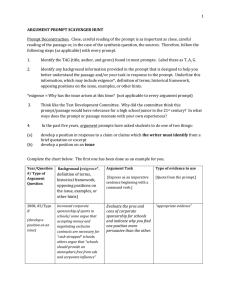Argumentative Essay
advertisement
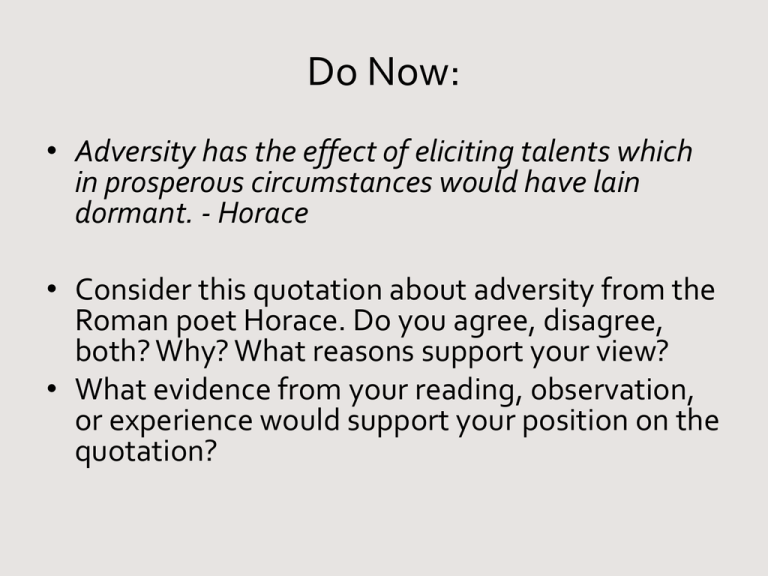
Do Now: • Adversity has the effect of eliciting talents which in prosperous circumstances would have lain dormant. - Horace • Consider this quotation about adversity from the Roman poet Horace. Do you agree, disagree, both? Why? What reasons support your view? • What evidence from your reading, observation, or experience would support your position on the quotation? Argumentative Essay Argumentative prompt will ask you to do any of the following: • Defend, challenge, or qualify a quotation about or particular take on a specific topic – Defend: give reasons to support argument – Challenge: reasoning contradicts argument – Qualify: agree/disagree with parts of argument • Evaluate the pros and cons of an argument and indicate why you find one position more persuasive than another. – Provide reasons supporting and contradicting argument; evaluate why one side is more convincing. • Take a position on a debatable statement provided. – Establish and support specific position on statement. Sample #1 • Defend, challenge, or qualify a quotation about or particular take on a specific topic. • 2002: Carefully read the following passage from Testaments Betrayed, by the Czech writer Milan Kundera. Then write an essay in which you support, qualify, or dispute Kundera’s claim. Support your argument with appropriate evidence. Sample #2 • Evaluate the pros and cons of an argument and indicate why you find one position more persuasive than another. • 2008: Some people argue that corporate partnerships are a necessity for cash-strapped schools. Others argue that schools should provide an environment free from ads and corporate influence. Using appropriate evidence, write an essay in which you evaluate the pros and cons of corporate sponsorship for schools and indicate why you find one position more persuasive than the other. Sample #2 (cont.) • 2004: Contemporary life is marked by controversy. Choose a controversial local, national, or global issue with which you are familiar. Then, using appropriate evidence, write an essay that carefully considers the opposing positions on this controversy and proposes a solution or compromise. Sample #3 • Take a position on a debatable statement provided. • 2010: Think about the implications of de Botton’s view of the role of humorists. Then write an essay that takes a position on de Botton’s claim about the vital role of humorists. Use specific, appropriate evidence to develop your position. Supporting Evidence Use knowledge in any of the following subject areas to support your argument: • literature • history • current events • science • technology • music • sports • human behavior Defend • Assertion: Laws which protect citizens from themselves are justified. • Our forefathers determined that it is the business of the government to provide all that shall affect our “life, liberty, and the pursuit of happiness.” Democracy works because the people have entrusted that power to their elected officials. It is government’s right, yes, and its duty to enact laws that best protect and preserve the lives of Americans. Therefore, the government, through our elected officials, has the right to protect citizens and to make judgments regarding how best to protect citizens from themselves. Because society will have to pay (through health and mental care) for a person who harms himself, society has the right to limit a person’s rights when he tries to harm himself. Challenge • Assertion: Laws which protect citizens from themselves are justified. • All human beings are distinct entities, possessing a spirit, soul, and body. The right to make private decisions affecting one’s life is a precious one. Any government, even in its best intentions, never has the right to impose its will on its citizens, even when it proposes to protect them from themselves. According to the values of our country, people should have the “liberty” to choose “life” or “happiness” on their own terms. Qualify • Assertion: Laws which protect citizens from themselves are justified • The Declaration of Independence states that all Americans have the right to “life, liberty, and the pursuit of happiness.” Therefore, it can be argued that our right to “life” sometimes hinges on the government protecting us from ourselves. Thus we have laws such as those prohibiting the sale of alcohol to minors and requiring us to wear seat belts in automobiles. Sometimes city, state, or national governments go too far, however, in determining just how Americans should be protected. Some cities have banned trans fats in restaurants, for instance. When a law crosses over the line from protecting Americans’ lives and begins to interfere with their liberties, then that law has gone too far. Laws which protect citizens from themselves are justified as long as those laws do not infringe upon individual liberty. Concession • An expression of concern for those who do not agree with you. • Good way to develop your ethos, or your credibility and character with your audience; shows you are fairminded and recognize two sides of an issue. • Example: – Civil libertarians might argue that the right to make private decisions affecting one’s life is a precious one, one that government has no right to intrude upon. They would say that any government, even in its best intentions, never has the right to impose its will on its citizens, even when it purposes to protect them from themselves. Yet, society will have to pay (through health and mental care) for a person who harms himself. Therefore, society has the right to limit a person’s rights when he tries to harm himself. How do I argue a point or position? • Present the issue/situation/problem. • State your assertion/claim/thesis. • Support your claim drawing on all that you know about the subject: what you’ve read, experienced, observed. (Avoid personal anecdotes and too many pop culture/celebrity references). • Acknowledge and respond to real or possible opposing views. • Make final comment or summary of evidence, extending it to the real world.

